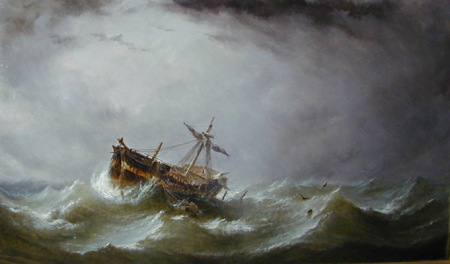The Ship in Distress or “You Seamen Bold” is a sea song that tries to describe the horrors suffered on a ship adrift in the ocean and without more food on board. Probably the origin begins with a Portuguese ballad of the sixteenth century (in the golden age of the Portuguese vessels), taken from the French tradition with the title La Corte Paille.
This version was very popular in the south of England
A. L. Lloyd writes ‘The story of the ship adrift, with its crew reduced to cannibalism but rescued in the nick of time, has a fascination for makers of sea legends. Cecil Sharp, who collected more than a thousand songs from Somerset, considered The Ship in Distress to be the grandest tune he had found in that country.’ (from here)
in But Two Came By 1968
| I You seamen bold who plough the ocean See dangers landsmen never know. It’s not for honour and promotion; No tongue can tell what they undergo. In the blusterous wind and the great dark water Our ship went drifting on the sea, Her rigging (1) gone, and her rudder broken, Which brought us to extremity (2). II For fourteen days, heartsore and hungry, Seeing but wild water and bitter sky, Poor fellows, they stood in a totter, A-casting lots as to which should die. The lot (3) it fell on Robert Jackson, Whose family was so very great. ‘I’m free to die, but oh, my comrades, Let me keep look-out till the break of day.’ III A full-dressed ship like the sun a-glittering(4) Came bearing down to their relief. As soon as this glad news was shouted, It banished all their care and grief. The ship brought to, no longer drifting, Safe in Saint Vincent, Cape Verde, she gained. You seamen all, who hear my story, Pray you’ll never suffer the like again (5). | NOTES 1) Marc say headgear 2) extremity: bring to the extremes to be intended also in a moral sense 3 )the one who pulled the shorter straw was the “winner”, and sacrificed himself for the benefit of the survivors, this practice was called ”the custom of the sea”: to leave the choice of the sacrificial victim to fate, it excluded the murder by necessity from being a premeditated murder 4) the juxtaposition between the two verses with the man ready for the sacrifice and sighting at dawn of the ship that will rescue them, it wants to mitigate the harsh reality of cannibalism, a horrible practice to say but that is always lurking in the moments of desperation and as an extreme resource for survival. In reality we do not know if the ship was only dreamed of by the sacrificial victim. 5) surviving sailors rarely resume the sea after the cases of cannibalism (see for example the Essex whaling story). In 1884 an English court condemned two of the three sailors of the “Mignonette” yacht who had killed Richard Parker, the 17-year-old cabin boy (the third had immunity because he agreed to testify); the death sentence was commuted at a later time in six months in prison. A curious case is that Edgar Allan Poe in 1838 in “The Narrative of Arthur Gordon Pym of Nantucket ” tells of four survivors forced into a lifeboat who decide to rely on the “law of the sea”, the cabin boy that pulled the shorter straw was called Richard Parker! |
A parody of the story is told with caustic humor in Little Boy Billy also known as the sea shanty “Three Sailors from Bristol City” both derived from the French song “La Courte Paille”
Little Boy Billy
The Ship in Distress
The Banks of Newfoundland
Un petit navire d’Espagne
La Courte paille/Il était un Petit Navire
LINK
https://mainlynorfolk.info/lloyd/songs/theshipindistress.html
http://www.mustrad.org.uk/songbook/sea_bold.htm
http://mudcat.org/thread.cfm?threadid=22872
https://anglofolksongs.wordpress.com/2015/05/04/the-ship-in-distress/
https://www.linkedin.com/pulse/anche-i-cannibali-hanno-un-cuoree-se-lo-mangiano-luca-luca-nave
http://www.canestrinilex.com/risorse/dudley-and-stephens-case-1884-mignonette/

